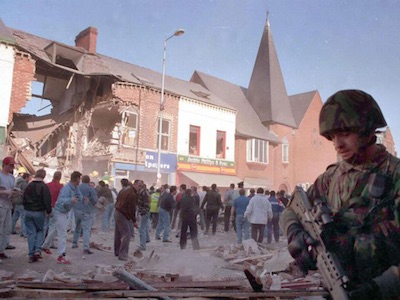
There has been a shocked reaction to evidence that the 1993 Shankill Road bomb, in which nine civilians and one IRA Volunteer died in a premature explosion, was planned by a double-agent working in concert with the British Crown forces.
It is believed that an informer working for the RUC Special Branch police may have deliberately tampered with the device to cause an outrage which would weaken the Provisional IRA ahead of negotiations with the British.
With the announcement of a complaint to the Ombudsman, the Shankill bombing has now joined a list of atrocities that are being investigated over covert Crown force involvement, including the Omagh bombing in 1998, the Dublin-Monaghan bombings in 1974, Bloody Sunday, Bloody Friday, and the killings carried out another IRA double-agent, codenamed “Stakenife”.
Although the informer -- known by his security force code of “AA” -- was involved in a number of successful IRA operations as a leading figure in the Ardoyne IRA, questions have been asked about to what extent IRA Volunteers were set up for capture or death.
In October 1993, Volunteers Thomas Begley and Sean Kelly walked into a fish-shop on the loyalist Shankill Road with orders to clear it of customers and then detonate an explosive device, aimed at a meeting of paramilitary leaders believed to be taking place upstairs.
The device is understood to have been a “directional” device, intended to explode upwards, towards the meeting of the UDA death squad ‘brigadiers’. But it exploded virtually as soon as Begley carried it to the counter, killing him and eight others and injuring Kelly, as well as dozens of passersby.
Anger over the ‘botched’ mission heralded a series of loyalist reprisals in which 14 people were murdered and scores more injured.
It is now reported that ‘AA’ was identified by the IRA as early as 2002 or 2003, shortly after the IRA deciphered Special Branch files on agents recovered from the RUC base at Castlereagh. Leaks from the stolen papers suggest ‘AA’ had extensively briefed his MI5 and Special Branch handlers on the aim and likely timing of the attack on the UDA, who may have been warned in advance.
The alleged double-agent is reported to have admitted recently that he had possession of the bomb used in the Shankill Road in October 1993 before it was handed over to Begley and Kelly.
Former republican prisoners say they strongly believe “AA” was given the go-ahead by his handlers to manipulate the device so that it exploded without any possibility of clearing the area around the device.
One ex-Belfast prisoner said: “It raises massive questions for the state, as to what extent it allowed its own citizens to die, who made those decisions and can they ever be made amenable.
“But for the IRA the questions will now start to re-emerge as to what extent volunteers and supporters were sacrificed by agents in the ranks, and what has the IRA done to rectify this, if anything?”
Still living in Ardoyne, the alleged double-agent refused to attend a commemoration in memory of Thomas Beagley on the 20th anniversary of the blast in 2013.
Relatives of the victims called for a full investigation. Charlie Butler, who lost three members of his family, said he and other families were devastated by the development.
He said: “Collusion is not a nice word for anyone but when it is collusion with innocent people losing their lives to protect someone else there has to be a line drawn to say that is wrong.
“[The security forces] were there to do a job, to protect people. If they knew about [the bombing] then they should pay.”
Sinn Fein, the DUP and both governments have declined to comment on the development, while PSNI chief George Hamilton has denied any knowledge of the plot. He said he did not want to “prejudge the outcome” of the ombudsman’s investigation.
“We don’t want to do anything that is going to traumatise families further and add to their grief and pain which will still be very real after all of these years,” he said.
The journalist who reported the revelations, Allison Morris, said that any confirmation by the Police Ombudsman that the Shankill bomb was “preventable” would change the understanding of that period of the conflict.
“This development raises allegations of collusion that overshadows all that has gone before it,” she said. “Was a botched attack allowed to go ahead and did the State allow civilians to die to shame republicans into a ceasefire?
“That’s now a question for the police ombudsman to answer.”
![[Irish Republican News]](https://republican-news.org/graphics/title_gifs/rn.gif)
![[Irish Republican News]](https://republican-news.org/graphics/title_gifs/harp.gif)

